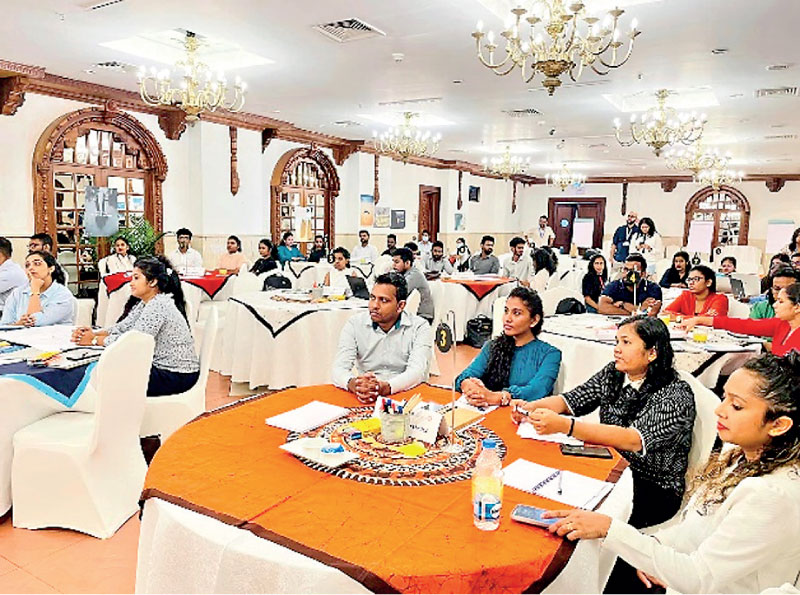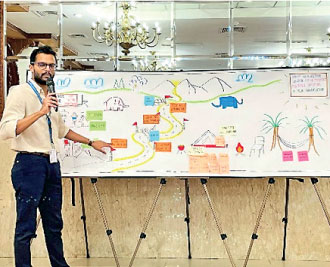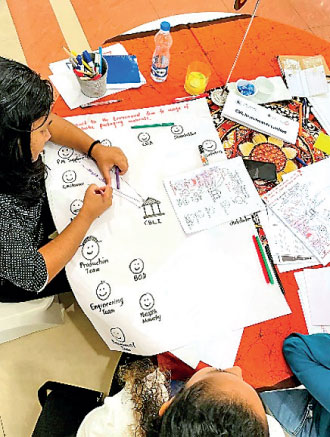Sunday Feb 15, 2026
Sunday Feb 15, 2026
Monday, 12 June 2023 01:20 - - {{hitsCtrl.values.hits}}

Teams from 12 companies participated in the accelerator
 |
| UNDP Citra Lab facilitating the session |
 |
| CBL Investments Team working on their road map
|
The Global Compact Network Sri Lanka hosted its first SDG Innovation Accelerator which is part of a five-phase accelerator program designed by the United Nations Global Compact. The session was facilitated by Citra Social Innovation Lab of the United Nations Development Program (UNDP) in Colombo. The inaugural Innovation Accelerator Program saw 60+ participants from 12 diverse Sri Lankan companies to advance their sustainability efforts, drive innovation and deliver tangible sustainability solutions. The accelerator program is an innovation and intrapreneurship accelerator for professionals under the age of 35 in participating UN Global Compact companies, designed toward preparing young professionals.
The full day session was held on 25 May, at the Winchester Hall, Kingsbury Hotel in Colombo. Network Sri Lanka has now completed the third phase of a five-phase accelerator program. The UNDP Citra Lab facilitators team included Ayushka Nugaliyadda, Kaushala Amarakoon, Ralani Weerasinghe and Sarika Warusavitarana.
The recently concluded session titled “Challenge Definition,” enabled participants to dive deeper into previously identified challenges by analysing key areas that define problems, and what must be done to overcome issues. The UN Global Compact agenda is to accelerate and scale the global collective impact of business by upholding the Ten Principles of the UN Global Compact and driving progress towards the SDGs.
This initiative emphasises the importance of accountability within companies and supportive ecosystems that enable transformative change where the solutions are tracked throughout the course of the development cycle to provide inspiration and serve as models for business innovation to achieve the SDGs.
Globally the program has had 870 participants from more than 335 companies across 15 countries from 2019 to 2022. Sri Lanka is concurrently featuring the 2023 course outline with regional partners like Brazil, Bangladesh, China, Ecuador, Georgia, Indonesia, Malaysia and Brunei, Mexico, Norway, South Africa, Switzerland and Liechtenstein, Turkiye, USA, UK and Ukraine, and are close to reaching 500 participants this year.
The SDG Innovation Accelerator program which began in January of this year, is a nine-month long program curated to create a culture of innovation within participant companies. The program will conclude with an SDG Innovation Summit in September in New York of this year to mark the finale of this year’s program. The SDG Innovation Accelerator is one of many accelerators that the UN Global Compact Network Sri Lanka hosts each year, along with accelerators on climate, target gender equality, and business and human rights. Network Sri Lanka is working toward promoting the importance and impact of corporate sustainability, while encouraging more corporates from various industries to join the UN Global Compact and drive change.
The five-phase program includes SDG Exploration, Challenge Identification, Challenge Definition, Solutions Development, Solutions Testing and Validation. The sessions were specifically designed to stimulate new ideas and use tools to transform concepts into well-defined and actionable projects. Phase One was held virtually, where companies such as CBL Investments, Aitken Spence, Talawakelle Tea Estates, TeeJay Lanka PLC, DIMO Lanka, Hela Clothing, First Energy, John Keells Holdings, IWMI, Hayleys Fabric, Horana Plantations, and Novateq Pallets participated in identifying their challenges and core principles.
Speaking on Citra Labs role in facilitating the workshops, Learning and Innovations Assistant, Kaushala Amarakoon said: “As facilitators, it was exciting to support the formulation of thought processes for young professionals representing their companies, working together from different industries to explore what challenges they face to overcome existing barriers and help articulate mechanisms to support the alignment of operations to the Ten Principles of the UN Global Compact.”
Earlier, on 24 April the phase two workshop prioritised the challenges relevant to the companies and industry. Phase three was centred on the use of the SDG impact assessment tools to prioritise impact and end results being pursued. Phase four which is scheduled to be held on the 28 June of this year, will see the evolution of challenges into solutions development.
The fifth and final phase, will enable organisations to find solutions, test implementation strategies, and validate their approaches. The Global Compact Network Sri Lanka is continuing to work with more companies this year to drive impact and allow Sri Lankan corporates to strengthen their commitment to their respective climate action, target gender equality, business and human rights, sustainable supply chains and SMEs strategies.